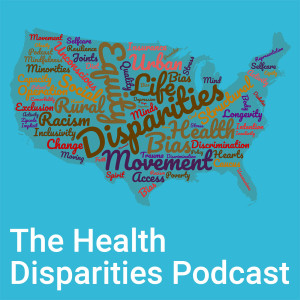The Health Disparities Podcast
The Health Disparities Podcast is the world’s leading health equity discussion forum and is a program of Movement is Life. This podcast features thought leaders in the world of equitable health, and highlights health disparities, social determinants of health and community-led solutions.
Episodes

Wednesday Jun 24, 2020
Wednesday Jun 24, 2020
Every month millions of patients visit Orthoinfo.org, a patient oriented orthopedics website from AAOS. Dr. Stuart Fischer leads the editorial team, which produces the content and translates articles into multiple languages.

Wednesday Jun 17, 2020
Wednesday Jun 17, 2020
A multitude of key health disparity indices show that we have not seen significant progress in narrowing the gap between minority and majority populations since the landmark report “Unequal Treatment” in 2003.

Wednesday Jun 10, 2020
Wednesday Jun 10, 2020
Dr Rahn Bailey discusses how for decades discrimination has played a central role in health disparities, and how gun violence compounds the problem through traumatic experiences, chronic stress and behavioral consequences.

Monday Jun 08, 2020
Monday Jun 08, 2020
Reverend Willis Steele hosts a discussion about the impact of COVID-19 in Southern states with Dr. Pernessa Seele, the CEO and founder of The Balm in Gilead, a faith-based organization that provides support to people and their families with chronic diseases such as diabetes, as well as working for the prevention of HIV and AIDS.

Wednesday Jun 03, 2020
Wednesday Jun 03, 2020
Speaking at the university where she was the only female and only African American student in her class, and in the auditorium named for her, Healing Hate conference keynote speaker Dr Vivian Pinn reflects on progressing her career during eras of segregation, discrimination, and civil rights.

Friday May 29, 2020
Friday May 29, 2020
Bill Finerfrock, Executive Director at the National Association of Rural Health Clinics, hosts an in-depth discussion about rural health disparities with a panel of experts from across the US.

Wednesday May 27, 2020
Wednesday May 27, 2020
Christina Jimenez, Ph.D. is an Associate Professor at the University of Colorado, and an expert in the processes of privilege that can both limit and promote opportunities for individuals, dependent on factors such as race, ethnicity, gender and class.

Friday May 22, 2020
Friday May 22, 2020
Medical anthropology may not be the first discipline we associate with public health, but it provides perspectives that are vital to understanding the many and complex intersections at the root of health disparities.

Wednesday May 20, 2020
Wednesday May 20, 2020
Professor Dayna Bowen Matthew is a leader in public health who focuses on structural and racial disparities in health care. In this podcast she discusses vast inequalities we see in health access and health outcomes between majority and minority populations, which she says are derived from systematic segregation, discrimination and racism.

Friday May 15, 2020
Friday May 15, 2020
Privilege is when a person or group enjoys an unearned advantage over other(s). As the COVID-19 pandemic has dramatically highlighted, those with less privilege often pay the ultimate price in times of crisis.






